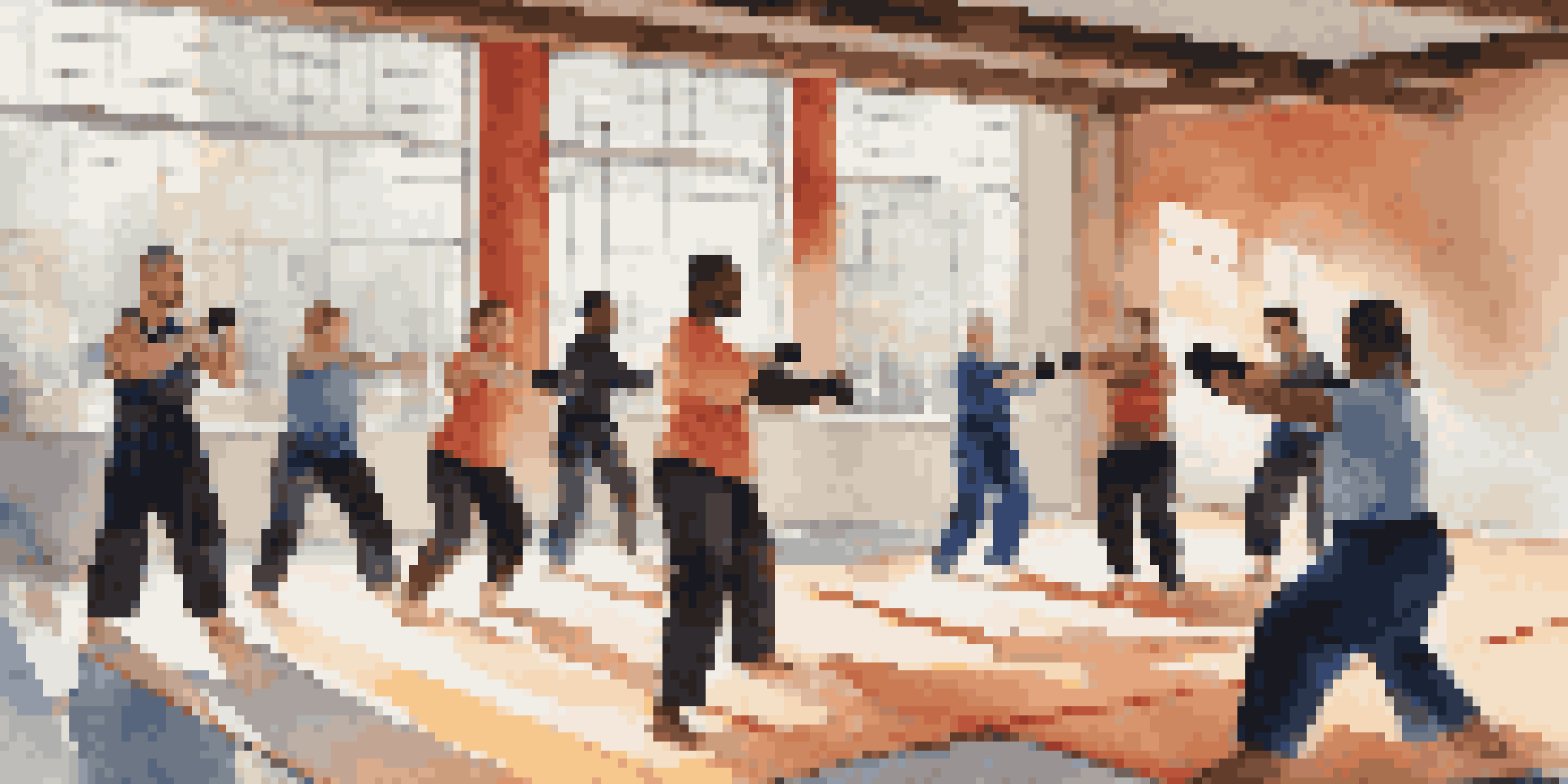Exploring the Different Types of Self-Defense Classes

Introduction to Self-Defense Classes and Their Importance
Self-defense classes are designed to teach individuals how to protect themselves in various situations. Whether you're looking to boost your confidence or learn practical skills, these classes provide valuable tools for personal safety. They cater to people of all ages and fitness levels, ensuring that everyone can find a suitable option.
The strongest weapon is a fearless mind.
The importance of self-defense training extends beyond physical techniques; it also involves mental preparedness and situational awareness. Knowing how to assess your surroundings and react appropriately can make all the difference in a threatening situation. By embracing self-defense training, individuals can cultivate a sense of empowerment and confidence.
Additionally, self-defense classes can foster a sense of community and support among participants. Many find encouragement and motivation from their peers, leading to lasting friendships and a shared commitment to personal safety. This social aspect can enhance the overall experience, making it not just about self-defense, but also about building connections.
Martial Arts: A Comprehensive Approach to Self-Defense
Martial arts encompass a variety of styles, each offering unique techniques for self-defense. Popular forms like karate, judo, and taekwondo blend physical fitness with discipline and focus. These classes often emphasize the importance of respect and self-control, which are essential components of effective self-defense.

One of the key benefits of martial arts training is the development of agility and strength. Practicing techniques regularly helps improve overall fitness while also enhancing reflexes and coordination. This physical conditioning can be a game-changer in a self-defense situation, allowing individuals to react swiftly and effectively.
Self-Defense Empowers Individuals
Self-defense classes not only teach physical techniques but also boost confidence and mental preparedness.
Moreover, martial arts classes often encourage a mindset of prevention over confrontation. Students learn how to avoid potentially dangerous situations and de-escalate conflicts whenever possible. This holistic approach not only prepares participants for physical altercations but also equips them with tools for navigating everyday life safely.
Krava Maga: The Practical Self-Defense System
Krav Maga is a self-defense system developed by the Israeli military, focusing on real-world situations and practical techniques. It's designed to be accessible, making it suitable for people of all ages and backgrounds. The training emphasizes instinctive movements and efficient defense strategies, allowing practitioners to respond quickly to threats.
To be prepared is half the victory.
In Krav Maga classes, students learn how to defend against various attacks, including armed and unarmed confrontations. The curriculum includes striking, grappling, and situational awareness, providing a comprehensive approach to self-defense. This versatility makes Krav Maga particularly appealing for those seeking a no-nonsense method for personal protection.
Additionally, Krav Maga training fosters mental resilience and confidence. Participants often leave feeling more empowered, as they develop the ability to handle stressful situations effectively. This mental fortitude can be just as important as physical skills when it comes to ensuring personal safety.
Boxing: Building Strength and Confidence Through Self-Defense
Boxing is not only a popular sport but also an effective self-defense method that emphasizes striking techniques and footwork. It teaches practitioners how to deliver powerful punches while maintaining balance and control. Many people find boxing classes to be an excellent way to improve their fitness while learning valuable self-defense skills.
One of the standout benefits of boxing training is its focus on conditioning and stamina. Regular sessions help build muscle, increase endurance, and improve overall physical health. This heightened fitness level can be crucial in a self-defense scenario, where quick reactions and sustained effort may be required.
Various Styles for Personal Safety
Different martial arts, like Krav Maga and Brazilian Jiu-Jitsu, offer unique approaches to self-defense that cater to diverse needs.
Moreover, boxing instills mental discipline and focus. As students learn to read their opponents and anticipate moves, they sharpen their decision-making skills under pressure. This mental training not only translates to better performance in the ring but also enhances the ability to stay calm and composed during real-life confrontations.
Brazilian Jiu-Jitsu: Mastering Ground Defense Techniques
Brazilian Jiu-Jitsu (BJJ) is a grappling-based martial art that focuses on ground fighting and submission holds. This form of self-defense is particularly effective for individuals of smaller stature, as it emphasizes leverage and technique over brute strength. BJJ teaches practitioners how to control an opponent and neutralize threats, making it a valuable skill set for personal safety.
In BJJ classes, students practice various techniques, including joint locks and chokeholds, to gain an advantage in close combat situations. The training often involves sparring, allowing participants to apply their skills in realistic scenarios. This hands-on experience not only builds confidence but also enhances problem-solving abilities under pressure.
Furthermore, Brazilian Jiu-Jitsu promotes a sense of community and camaraderie among participants. Many practitioners form strong bonds with their training partners, creating a supportive environment that encourages growth and learning. This sense of belonging can be a powerful motivator for individuals seeking to improve their self-defense skills.
Self-Defense for Women: Specialized Classes and Techniques
Self-defense classes specifically tailored for women address unique challenges and concerns. These courses focus on practical strategies and techniques that empower women to protect themselves in various situations. By creating a supportive environment, these classes help participants build confidence and skills that can be applied in real life.
In many women's self-defense classes, instructors emphasize awareness and prevention. Participants learn how to identify potentially dangerous situations and develop strategies to avoid them. This proactive approach not only enhances personal safety but also promotes a mindset of vigilance and empowerment.
Choosing the Right Class Matters
Selecting a self-defense class should align with your personal goals, fitness level, and comfort to ensure a positive experience.
Additionally, these classes often include techniques to escape common attacks, such as grabs or holds. By practicing these skills in a controlled setting, women can gain the confidence to react effectively if faced with a threatening situation. Ultimately, specialized self-defense training for women helps cultivate a sense of security and resilience.
Choosing the Right Self-Defense Class for You
With so many self-defense classes available, choosing the right one can feel overwhelming. It's essential to consider your personal goals, fitness level, and preferences when selecting a class. Some may prioritize physical fitness, while others might seek practical techniques for real-world situations.
Visiting local studios or gyms to observe classes can provide valuable insights into the training style and atmosphere. Many instructors offer introductory sessions or workshops, allowing potential students to test the waters before committing. This hands-on experience can help you gauge whether a specific class aligns with your needs and comfort level.

It's also beneficial to seek recommendations from friends or family who have experience with self-defense training. Hearing about their experiences can offer guidance and help narrow down your options. Ultimately, finding the right self-defense class is about aligning your goals with the training style that resonates with you.